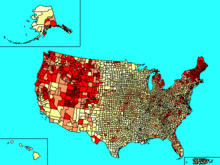
Back أمريكيون إسكتلنديون Arabic Inmigración escocesa en los Estados Unidos Spanish Scotto-Américains French Orang Skotlandia Amerika ID Scots Americans SCO Scottish Americans SIMPLE Người Mỹ gốc Scotland Vietnamese 蘇格蘭裔美國人 Chinese
Ameireaganaich Albannach | |
|---|---|
 | |
| Total population | |
| 8,422,613 (3.6%) Scottish alone or in combination 1,471,817 (0.7%) Scottish alone 794,478 (0.3%) Scots-Irish alone or in combination 2020 census[1][2] Other estimates 20–25 million[3][4][5][6] Up to 8.3% of the U.S. population | |
| Regions with significant populations | |
| Predominantly in New England, Appalachia and the Deep South; Plurality in New York, Massachusetts, West Virginia, Idaho, North Carolina, Florida, California and Pennsylvania | |
| Languages | |
| English (American English dialects) Scottish Gaelic and Scots speaking minorities | |
| Religion | |
| Christianity (including Presbyterianism, Baptist, Pentecostalism, Methodist, Protestantism and Roman Catholicism), other religions (including deism[7]) | |
| Related ethnic groups | |
| Scotch-Irish Americans, English Americans, Irish Americans, Welsh Americans, Manx Americans, British Americans, Cornish Americans, Scottish Canadians, Scotch-Irish Canadians, Scottish Australians, and other Scots |
Scottish Americans or Scots Americans (Scottish Gaelic: Ameireaganaich Albannach; Scots: Scots-American) are Americans whose ancestry originates wholly or partly in Scotland. Scottish Americans are closely related to Scotch-Irish Americans, descendants of Ulster Scots, and communities emphasize and celebrate a common heritage.[8] The majority of Scotch-Irish Americans originally came from Lowland Scotland and Northern England before migrating to the province of Ulster in Ireland (see Plantation of Ulster) and thence, beginning about five generations later, to North America in large numbers during the eighteenth century. The number of Scottish Americans is believed to be around 25 million, and celebrations of 'Scottishness' can be seen through Tartan Day parades, Burns Night celebrations, and Tartan Kirking ceremonies.
Significant emigration from Scotland to America began in the 1700s, accelerating after the Jacobite rising of 1745, the steady degradation of clan structures, and the Highland Clearances. Even higher rates of emigration occurred after these times of social upheaval.[a] In the 1920s, Scotland experienced a reduction in total population of 0.8%, totally absorbing the natural population increase of 7.2%: the U.S. and Canada were the most common destinations of these emigrants.[b][11]: 6 A common misconception is that most Scottish Americans are descended from Highlanders fleeing persecution or clearance. Instead, by far the commonest Scottish immigrant was an economic migrant from the Lowlands, attracted by the opportunities in North America.[9]: 11
- ^ "English Most Common Race or Ethnicity in 2020 Census". United States census. October 10, 2023. Retrieved October 21, 2023.
- ^ "Detailed Races and Ethnicities in the United States and Puerto Rico: 2020 Census". United States census. September 21, 2023. Retrieved October 21, 2023.
- ^ James McCarthy and Euan Hague, 'Race, Nation, and Nature: The Cultural Politics of "Celtic" Identification in the American West', Annals of the Association of American Geographers, Volume 94 Issue 2 (5 Nov 2004), p. 392, citing J. Hewitson, Tam Blake and Co.: The Story of the Scots in America (Edinburgh: Canongate Books, 1993).
- ^ Tartan Day 2007 Archived 2012-04-15 at the Wayback Machine, scotlandnow, Issue 7 (March 2007). Accessed 7 September 2008.
- ^ "Scottish Parliament: Official Report, 11 September 2002, Col. 13525". Scottish.parliament.uk. Archived from the original on August 7, 2011. Retrieved August 25, 2012.
- ^ "Scottish Parliament: European and External Relations Committee Agenda, 20th Meeting 2004 (Session 2), 30 November 2004, EU/S2/04/20/1" (PDF). Scottish.parliament.uk. August 14, 2011. Archived from the original (PDF) on June 5, 2011. Retrieved August 25, 2012.
- ^ Church, College, and Clergy, Page 76, Brian J. Fraser - 1995
- ^ Celeste Ray, 'Introduction', p. 6, id., 'Scottish Immigration and Ethnic Organization in the United States', pp. 48-9, 62, 81, in id. (ed.), The Transatlantic Scots (Tuscaloosa, AL:University of Alabama Press, 2005).
- ^ a b Devine, T M (2018). The Scottish Clearances: A History of the Dispossessed, 1600–1900. London: Allen Lane. ISBN 978-0241304105.
- ^ Devine, T. M. (2012). To the ends of the earth : Scotland's global diaspora, 1750-2010. London: Penguin. ISBN 978-0-24-196064-6.
- ^ a b Harper, Marjory (1998). Emigration from Scotland between the wars: opportunity or exile?. Manchester: Manchester University Press. ISBN 9780-7190-8046-3.
Cite error: There are <ref group=lower-alpha> tags or {{efn}} templates on this page, but the references will not show without a {{reflist|group=lower-alpha}} template or {{notelist}} template (see the help page).
© MMXXIII Rich X Search. We shall prevail. All rights reserved. Rich X Search